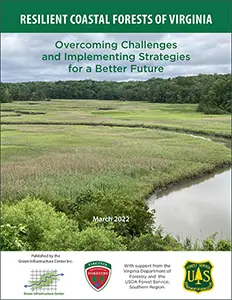 The Green Infrastructure Center (GIC), Virginia Department of Forestry (VDOF), Georgia Forestry Commission (GFC) and South Carolina Forestry Commission (SCFC) evaluated threats that may impact coastal forests. The two-year project was funded by the states and the US Forest Service and concluded in 2020.
The Green Infrastructure Center (GIC), Virginia Department of Forestry (VDOF), Georgia Forestry Commission (GFC) and South Carolina Forestry Commission (SCFC) evaluated threats that may impact coastal forests. The two-year project was funded by the states and the US Forest Service and concluded in 2020.
Coastal forests are being impacted by various threats — from development, to insects, to changes in weather, to fire risks. Climate change can cause both longer periods of drought, as well as more extreme weather events (high winds and greater amounts of rain). Longer and hotter periods can cause tree stress and make forests more susceptible to pest damage. Salt can damage coastal forests far from the shore as hurricanes carry saline water far inland. Furthermore, permanent changes in sea levels can deplete coastal forest buffers. The RCF project assessed the condition of our coastal forests and the actions we can all take to ensure our forests are healthy long into the future.
Final reports, including Resilient Coastal Forests of Virginia: Overcoming Challenges and Implementing Strategies for a Better Future, and a guide for replicating the process are available on the website.




